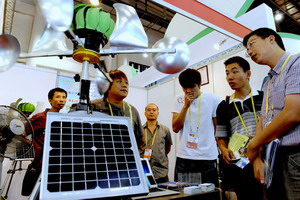HK to boost yuan's internationalization
Updated: 2011-09-10 14:46
(Xinhua)
|
|||||||||||
XIAMEN-- Hong Kong is exerting efforts to build itself into an offshore center for RMB or yuan, China's currency, which, experts say, will accelerate the currency's internationalization process.
Hong Kong will be dedicated to developing cross-border settlement in RMB and establishing an offshore center accordingly, Hong Kong Financial Secretary John Tsang Chun-wah said Wednesday at a forum in the southeastern city of Xiamen.
"Hong Kong will make it more convenient for mainland enterprises to trade and invest in Hong Kong," he said at the 15th China International Fair for Investment and Trade, which opened Wednesday and will end on Sunday.
Central authorities have supported Hong Kong becoming an offshore RMB center in an effort to strengthen the city's status as a global financial hub and push forward the internationalization of the yuan.
The most recent support came last month when Vice Premier Li Keqiang visited Hong Kong, outlining a range of measures to boost its role as an offshore RMB center, including rules allowing currency holdings in the city to be used for direct investment in the mainland.
On the same day, the Ministry of Finance issued 20 billion yuan ($3.1 billion) of yuan-denominated treasury bonds in Hong Kong, another step down the road toward internationalization.
John Tsang Chun-wah said these measures will be a great incentive for developing the yuan's offshore market in Hong Kong and encouraging RMB financial management innovation.
An offshore RMB center is very important in promoting the internationalization of the yuan, as it is a market for transactions, deposits and innovations, said Yang Tao, an expert with the Chinese Academy of Social Sciences, a government think tank.
Through its economic exchanges with the mainland, Hong Kong's efforts to establish such a position are very promising, he said.
In the first half of the year, the mainland's non-financial direct investment in Hong Kong hit $14.8 billion, accounting for 62 percent of the total non-financial outbound direct investment, according to Yu Jianhua, China's assistant minister of commerce.
Hong Kong's RMB deposits grew by 3.4 percent from June to reach 572.2 billion yuan in July, according to the Monetary Authority of Hong Kong. Total RMB remittance for cross-border trade settlement was 148.97 billion yuan in July, compared to 205.09 billion yuan in June.
The Chinese government is promoting cross-border trade settlement in yuan as a means to internationalize the yuan. Currently, the Chinese currency can not flow into and out of the country freely under capital accounts, which is seen as an obstacle for internationalizing the yuan.
As capital accounts of RMB have not been fully opened, building an offshore center is significant in enhancing the internationalization of RMB, analysts said.
Demands of trade settlement in yuan are huge in Hong Kong, said Chen Wen, a vice manager of the business optimization department of the Bank of China (Hong Kong), adding that the volume of yuan settlement in Hong Kong has totaled 1.8 trillion yuan since 2009.
"It is a huge figure and most of the transactions occurred during the past 12 months," he said.
As part of its plans to internationalize the RMB, China's Ministry of Commerce said late last month that it would try to formally green light foreign direct investment in RMB in September.
If implemented, the rules will expand channels for overseas-acquired RMB funds to flow back into the country, accelerate the issuance of yuan-denominated bonds and other forms of yuan financing in Hong Kong, and give a push to the RMB's internationalization drive, Chen said.
Trade settlement in yuan is just the beginning of forming an overseas RMB market, Chen added. The next steps should be expanding investment channels, increasing investment products to stimulate RMB deposits in Hong Kong, and attracting RMB to Hong Kong from the overseas market.
Related Stories
Yuan will be fully convertible by 2015 2011-09-09 11:14
HK firms more confident in yuan than other currencies 2011-09-07 10:03
China central bank may launch RMB QFII trials soon 2011-09-08 16:15
Firmer RMB helps curb inflation: Zoellick 2011-09-06 13:24
ICBC Leasing to focus on RMB settlements 2011-09-06 10:25
- China's August exports grow 24.5%
- Love and fear of Chinese investment
- Price index softens for first time in months
- Consumer confidence rebounds
- Jetstar launches flight to Chinese city Ningbo
- China's bankcard transactions total 179t yuan in H1
- China's August auto sales up 4.15%
- New CEO of HSBC Hong Kong appointed













